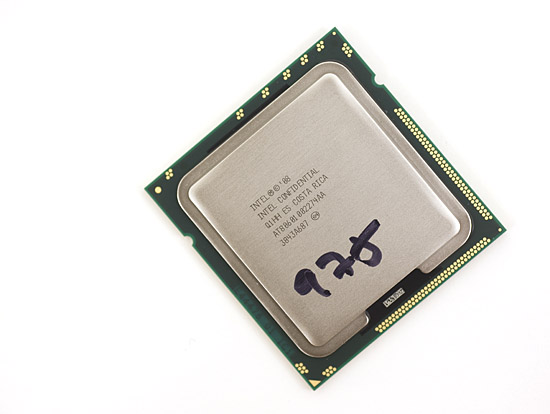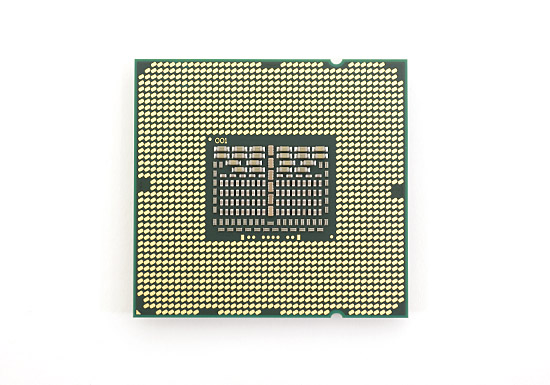Intel’s Core i7-975 & 950: Preparing for Lynnfield
by Anand Lal Shimpi on June 3, 2009 12:00 AM EST- Posted in
- CPUs
Seven months have passed since Intel officially launched its Core i7 processors, and for seven months they have remained at the top of our performance charts. Albeit pricey, Nehalem can’t be beat; it is the world’s fastest desktop microprocessor.
Just last week we previewed Intel’s upcoming more mainstream Nehalem, codenamed Lynnfield. Based on our early results and leaked Intel roadmaps, I’m expecting Lynnfield to pretty much negate the need for low end LGA-1366 Core i7 parts. Rather than allow Lynnfield to cannibalize Intel’s high-end LGA-1366 Core i7 platform, Intel is raising the performance bar with two new i7 CPUs: the Core i7 975 Extreme and the Core i7 950.
| Processor | Clock Speed | Cores / Threads | Maximum Single Core Turbo Frequency | TDP | Price |
| Intel Core i7-975 Extreme | 3.33GHz | 4 / 8 | 3.60GHz | 130W | $999 |
| Intel Core i7-965 Extreme | 3.20GHz | 4 / 8 | 3.46GHz | 130W | $999 |
| Intel Core i7-950 | 3.06GHz | 4 / 8 | 3.33GHz | 130W | $562 |
| Intel Core i7-940 | 2.93GHz | 4 / 8 | 3.20GHz | 130W | $562 |
| Intel Lynnfield 2.93GHz | 2.93GHz | 4 / 8 | 3.60GHz | 95W | $562 |
| Intel Core i7-920 | 2.66GHz | 4 / 8 | 2.93GHz | 130W | $284 |
| Intel Lynnfield 2.80GHz | 2.80GHz | 4 / 8 | 3.46GHz | 95W | $284 |
| Intel Lynnfield 2.66GHz | 2.66GHz | 4 / 4 | 3.20GHz | 95W | $196 |
The 975 replaces the 965 and is priced at $999 while the 950 replaces the i7-940 and is priced at $562. The chips run at 3.33GHz and 3.06GHz, respectively, with maximum turbo frequencies topping out at 3.6GHz and 3.33GHz. Intel really has no other external motivation to push for higher frequency parts, so we only see a bare minimum increase in specs here.

The Core i7 Extreme part, like its predecessor, ships unlocked so you can easily overclock it. Its un-core (L3 cache + memory controller) operates at 2.66GHz, just like the i7-965. The i7-950 is locked and runs its uncore at 2.13GHz, just like all other non-Extreme i7s.

Both of these chips use Intel’s new D0 stepping so they should clock up a bit higher than the original i7s.










44 Comments
View All Comments
strikeback03 - Thursday, June 4, 2009 - link
It was never able to properly shut the system down, the jumper configuration was set to hibernate the system 5 seconds after the ignition was turned off, instead it waited about a minute. Once a week or so it would refuse to start the system when the ignition was turned on until I pulled the computer case out of the dashboard and then put it back in. Eventually that problem grew more frequent, now when power is applied the led on the M3 blinks but it won't turn a system on. I replaced it with an M2-ATX and that has not had any problems. I have an Intel Atom 330 LF2 board, that board seems to draw the majority of its power off the 5V rail, so apparently the 6A the M3 could provide was not enough 5V for long-term use.TA152H - Wednesday, June 3, 2009 - link
Just an FYI, it's stated that the new i7 975 is 2.5 faster than Intel's fastest Pentium 4, but you didn't test Intel's fastest Pentium 4. The Pentium EE 965, running at 3.73 was it. It also had better power characteristics, since it was a later revision and, if I remember, correctly, had additional power savings modes enabled (EIST?).Also, you can't compare power draw between a 45 nm part and 65 nm and get disgusted. 45nm was a big advance for Intel in lowering power, and it would have been a very significant boost for the Pentium 4. Still, it was a terrible design, so your point is well taken, but it would not have been THAT terrible on 45nm. I think 5 GHz would have been easy, 6 GHz probably would not have been too difficult either. It's a pity we never got to see it, just out of curiousity.
aeternitas - Wednesday, June 3, 2009 - link
Curiousity? Take the average gain of all CPUs in question and you can come up with a rather accurate line of performance per Mhz. It would take longer to get the CPU performance numbers than to do the actual math.6 and 7GHz CPUs come with instability. Thats why we stopped at about 4Ghz and started to work smart instead of hard, like the G4/G5 cpus of old.
BabaBlackSheep - Wednesday, June 3, 2009 - link
I was just wondering how fast these stock fans for these processors are? The last time I got a new processor (Intel) was 3.5 years ago. It was insanely noisy. Has this changed?TotalLamer - Wednesday, June 3, 2009 - link
As much as I would love to support AMD, reviews like this make it very, very difficult at the moment.stimudent - Wednesday, June 3, 2009 - link
does this Intel processor have 'ethics violations' etched into the die too?TA152H - Wednesday, June 3, 2009 - link
Why? Neither processor is even remotely attractive to most people. They're performance is fine, but they are too expensive for what they are, again, for most people. If you're running a business, and faster performing processors helps your workers work faster, the $999 for the 975 is essentially nothing, and well worth it. But, for most people, neither of these processors are relevant.AMD makes horrible, badly-designed processors, but, is that so different from Intel IGPs? For a lot of people, and AMD processor with and 790GX is a better platform than an Intel based processor with the G45, and a lot of people only need an IGP.
I really do not think ATI was a bad purchase for AMD. It's made their platform a lot stronger vis-a-vis Intel. From a processor perspective, I agree, AMD sells trash, but as a platform, it can be very attractive because of ATI.
regnez - Wednesday, June 3, 2009 - link
No one said AMD processors were trash, except you. You kind of have a back and forth on your own argument: On the one hand, AMD cannot compete on the ultra high-end, on the other, not many people buy ultra high-end equipment.However, to say that AMD is releasing trash is just nonsense. Their lower-end processors are decent and compete with Intel reasonably well at given price points. They just don't have anything to match Intel at the top, which is not a big deal to most folks.
aeternitas - Wednesday, June 3, 2009 - link
"Most folks" do not read Anandtech. We need to look at the types that visit this site.I think that's a huge point.
Azsen - Wednesday, June 3, 2009 - link
When is Core i7 due on the notebook? I.e. quad core goodness?I wish Intel and AMD would focus on releasing better performing and lower power parts for the notebooks rather than desktops. Desktops are old school, the notebook is the way of the future and you can't notice much performance difference for general applications and even the odd game. Sure if you're a hard core gamer or need workstation performance you'd get a desktop as you can throw whatever you like in it, but everything else in between is better off as a notebook.